The following is a list of recipients of the various awards, prizes, and honors presented during the 119th annual meeting of the American Historical Association on Friday, January 7, 2005, in the Sheraton Seattle, Grand Ballroom C.
Awards for Scholarly Distinction
In 1984 the Council of the American Historical Association established the American Historical Association Award for Scholarly Distinction. Each year a nominating jury, composed of the president, president-elect, and immediate past president, recommends to the Council of the Association up to three names for the award. Nominees are senior historians of the highest distinction in the historical profession who have spent the bulk of their professional careers in the United States. Previous awards have gone to Nettie Lee Benson, Woodrow Borah, Alfred D. Chandler Jr., Thomas D. Clark, Angie Debo, Helen G. Edmonds, Elizabeth Eisenstein, Peter Gay, Felix Gilbert, John Whitney Hall, Tulio Halperín-Donghi, John Higham, H. Stuart Hughes, Margaret Atwood Judson, Nikkie R. Keddie, George F. Kennan, Paul Oskar Kristeller, Gerhart B. Ladner, Gerda Lerner, Wallace T. MacCaffrey, Ramsay MacMullen, Ernest R. May, Arno J. Mayer, Richard P. McCormick, August Meier, Edmund Morgan, George L. Mosse, Robert O. Paxton, Earl Pomeroy, H. Leon Prather Sr., Benjamin Quarles, Edwin O. Reischauer, Robert V. Remini, Nicholas V. Riasanovsky, Caroline Robbins, Carl E. Schorske, Benjamin I. Schwartz, Kenneth M. Setton, Kenneth M. Stampp, Chester G. Starr, Barbara and Stanley Stein, Lawrence Stone, Sylvia L. Thrupp Strayer, Merze Tate, Emma Lou Thornbrough, Brian Tierney, Eugen Weber, Gerhard Weinberg, and George R. Woolfolk.
Joining this distinguished list are John G. A. Pocock (Johns Hopkins Univ.) and Arthur M. Schlesinger Jr. (City Univ. of New York). President-elect Sheehan read the following citations at the General Meeting.
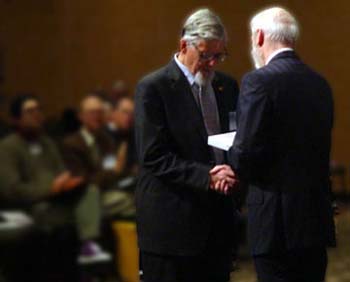
John G. A. Pocock
John G. A. Pocock, Harry C. Black Professor Emeritus at the Johns Hopkins University, is internationally renowned as a preeminent historian of political and historical thought and as one of the most important early modern British historians of the last 50 years. Emphasizing the contextual study of the languages of political thought, Pocock’s works have provided a methodological agenda for many other scholars, and have profoundly influenced not only historians but also political scientists, philosophers, and literary scholars. Pocock is the leading historian of the development and transmission of republicanism from its classical roots through the “Machiavellian Moment” of the Italian Renaissance and the English 17th century to the era of the American Revolution. And Pocock has transformed our understanding of the development of our discipline by his studies of varying modes of historical consciousness.
Each of Pocock’s works have set the terms within which other scholars frame their understanding of his chosen topic, commencing with his classic study of the importance of the common law mind and of the roles of custom, law, and history in 17th-century English political debates in The Ancient Constitution and the Feudal Law: A Study of English Historical Thought in the Seventeenth Century (Cambridge Univ. Press, 1957). In The Machiavellian Moment: Florentine Political Thought and the Atlantic Republican Tradition (Princeton Univ. Press, 1975) and The Political Works of James Harrington (Cambridge Univ. Press, 1977), Pocock demonstrated the agrarian and classical character of early modern republicanism, with its crucial emphases on the armed citizen and the ideal superiority of real over personal property, and consequent fears about the dangers of commerce and corruption. These works, and Politics, Language, and Time: Essays on Political Thought and History (Methuen, 1972), Three British Revolutions: 1641, 1688, 1776 (Princeton Univ. Press, 1980), andVirtue, Commerce, and History: Essays on Political Thought and History, Chiefly in the Eighteenth Century (Cambridge Univ. Press, 1985), excavated and elucidated the complex vocabularies of political thinking from Machiavelli to the Scottish Enlightenment and American Revolution. Pocock’s ongoing multivolume study, Barbarism and Religion (Cambridge Univ. Press, 1999– ), a lush and vibrant contextual study of the intellectual world of Edward Gibbon and of the quarreling family of Enlightenment historians, further enhances our understanding of the history of historiography and of the European Enlightenment. John Pocock is fully deserving of the American Historical Association’s Award of Scholarly Distinction.
No historian of the 20th century has had so great an influence in so many arenas as has Arthur M. Schlesinger Jr. The son of a great historian whose work helped broaden the profession’s understanding of the boundaries of historical inquiry, Arthur Schlesinger Jr. broadened the conception of the role a historian can play in the life of the nation.
Schlesinger published his first book, Orestes A. Brownson: A Pilgrim’s Progress (Little, Brown and Company), in 1939, and his most recent book, War and the American Presidency (W. W. Norton), in 2004. In between, he has written some of the most influential works in several fields of American history: among them The Age of Jackson (Little, Brown and Company, 1945), for which he won the first of two Pulitzer Prizes and through which he recast the historiography of the Jacksonian age; the three volumes of The Age of Roosevelt (Houghton Mifflin, 1957), which established the outlines of an interpretation of the New Deal that continues to shape most subsequent scholarship; The Imperial Presidency (Houghton Mifflin, 1973), which was at once an intervention in a contemporary political debate and a powerful—and still relevant—inquiry into the boundaries of presidential power; and a series of major reference works on the history of political parties, presidential elections, and many other areas of political history of which he was the principal editor.
During many years of great scholarly productivity, Schlesinger was also deeply engaged in the nation’s public life. His powerful commentary on postwar politics, The Vital Center: The Politics of Freedom (Houghton Mifflin, 1949), helped define the character of liberalism for a generation. He was one of the founders of Americans for Democratic Action, an active member of the two Stevenson campaigns in the 1950s, and most famously an early supporter and later White House advisor to John F. Kennedy. After Kennedy’s death, he wrote the most influential early chronicle of the presidency,A Thousand Days: John F. Kennedy in the White House (Houghton Mifflin, 1965), for which he received a second Pulitzer Prize, and in 1978 published the first major biography of Robert F. Kennedy, Robert Kennedy and His Times (Houghton Mifflin).
Arthur Schlesinger began his academic career at Harvard, alongside his father, and taught there until leaving Cambridge to serve in the Kennedy administration. After his time in Washington, he moved to New York and began teaching in the City University of New York, where he remained until his retirement in the 1990s. But through all these years, Schlesinger was a citizen of a far broader world than his academic affiliations describe. Those who have read his memoir, A Life in the Twentieth Century (Houghton Mifflin, 2000), have sometimes been astonished by the range of his acquaintances, even as a young man, and the extraordinary variety of his experiences and achievements.
He is, in short, a singular figure in the history of our profession—a man whose extraordinary influence as a scholar, which alone gives him claim to being one of the most important historians of our time, has at times been overshadowed by his equally remarkable influence as one of the most important public intellectuals of the 20th, and now 21st, centuries.
The Troyer Steele Anderson Prize
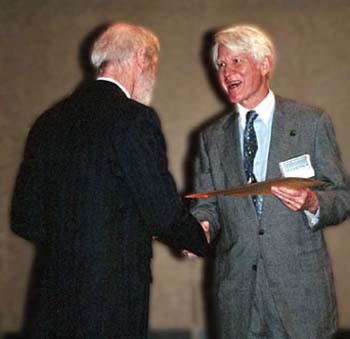
Albert Beveridge III
Established in 1963 through a bequest by Frank Maloy Anderson, a longtime AHA member, this prize is awarded for outstanding contributions to the advancement of the purposes of the Association and has been conferred just four times. The Council selects a recipient based upon the recommendations of the Professional Division, which serves as a nominating jury in consultation with the Research and Teaching Divisions. The Anderson Prize was awarded to Albert J. Beveridge III, the Association’s legal counsel.
Albert Beveridge comes from a distinguished family whose ties to the American Historical Association go back to before its founding. This undoubtedly helps explain his great loyalty to the organization, and his deep knowledge of its institutional practices and history. But Beveridge’s special contributions to the AHA are uniquely his own. He has served as the AHA’s legal counsel since 1994, and in fact played that role informally for many years preceding his official appointment. As the AHA’s lawyer, he has provided invaluable counsel to the staff, officers, and executive director on every conceivable aspect of the organization’s activities that impinge on the law—which is to say, almost all of them. Given the confidential nature of such contributions, many will never receive the recognition that their importance would otherwise merit. But a few can be mentioned here: his central role in helping organize and incorporate the new National History Center; his wise counsel in shaping the evolution of the AHA’s Statement on Standards of Professional Conduct; and his steady support of the Professional Division in particular as it has sought effective means for addressing questions of misconduct in the practice of history. Beveridge has given countless hours to these and many other initiatives of the AHA, and he done so with expert knowledge of the law, unfailing good humor, and real wisdom about what the law can and cannot accomplish. The American Historical Association has been immeasurably improved by Albert Beveridge’s generosity, so it is only fitting that his extraordinary work be recognized by the award of the Troyer Steele Anderson Prize for outstanding contributions to the advancement of the purposes of the American Historical Association.
Eugene Asher Distinguished Teaching Award
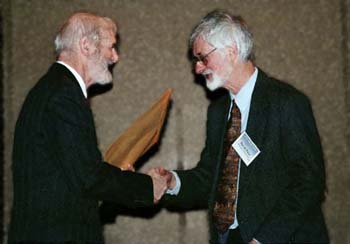
David Pace with Jonathan Spence
Established in 1986, the Eugene Asher Distinguished Teaching Award recognizes outstanding teaching and advocacy for history teaching at two-year, four-year, and graduate colleges and universities, by commending an inspiring teacher whose pedagogical techniques and mastery of subject matter make a lasting impression and substantial difference to students of history. The prize is named for the late Eugene Asher who was for many years a leading advocate for history teaching. The Society for History Education (SHE) shares with the AHA sponsorship of the award. Members of the AHA and SHE submit nominations to the Committee on Teaching Prizes.
The 2004 honoree is David Pace, professor of history at Indiana University. The winner of numerous previous teaching awards and grants, Pace has actively sought interdisciplinary connections to deepen his students’ learning. Pace is the co-director of several programs to encourage productive thinking on controversial issues, past and present. Practitioner of active and collaborative learning, author of numerous works on pedagogy, and deeply reflective about the basic skills young historians need to succeed, Pace embodies the commitment to teaching excellence for which the Asher Award stands.
Beveridge Family Teaching Award
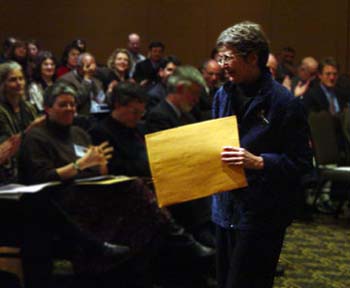
Joan Arno
Established in 1995, this prize honors the Beveridge family’s long-standing commitment to the AHA and to K–12 teaching. Friends and family members endowed this award to recognize excellence and innovation in elementary, middle, and secondary school history teaching, including career contributions and specific initiatives. The individual can be recognized either for individual excellence in teaching or for an innovative initiative applicable to the entire field. It is offered on a two-cycle rotation: in even-numbered years, to an individual; in odd-numbered years, to a group. The prize was first offered in 1996, and in 2004 it is awarded to an individual teacher.
The ninth Beveridge Family Teaching Award went to Joan Arno, a teacher at George Washington High School in Philadelphia, Pennsylvania. This gifted and multitalented teacher has received scores of honors and the admiration of students and colleagues. A model lifelong learner, Arno’s professional activities have garnered her a national reputation as an educator. Named a distinguished teacher by the White House in 1995, she has worked with the National Center for History in the Schools to improve the teaching of world history and the World Affairs Council to advance Japanese history in American schools. Her commitment to and passion for internationalizing high school history represent teaching at its finest and we commend her for a life dedicated to helping students comprehend the world.
John E. O’Connor Film Award
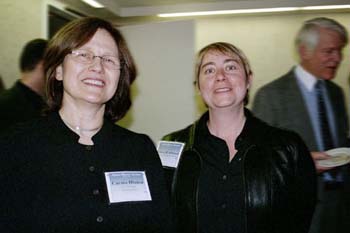
Carma Hiton and Vanessa Schwartz
In recognition of his exceptional role as a pioneer in both teaching and research regarding film and history, the American Historical Association established this award in honor of John E. O’Connor of the New Jersey Institute of Technology. The award seeks to recognize outstanding interpretations of history through the medium of film or video. Essential elements are stimulation of thought, imaginative use of the media, effective presentation of information and ideas, sensitivity to modern scholarship, and accuracy. The production should encourage viewers to ask questions about historical interpretations as well as make a contribution to the understanding of history.
The 11th O’Connor Award was presented to Morning Sun (Longbow Group, 2003), Carma Hinton, producer; Richard Gordon, director and producer; and Geremie Barmé, director, producer, and writer. Morning Sun is a compelling and exciting documentary film about the history of the Cultural Revolution in China that demonstrates the inseparable connection of political movements in the 20th century to issues of spectacle, representation, and cinematic culture itself. Morning Sun narrates the development of revolutionary thinking in China from the mid-1960s to mid-1970s and its link to visual narratives. The film does not just use these images as “illustrations.” Instead, the filmmakers deftly demonstrate the importance and power of images in advancing the revolutions of the 20th century.
Nancy Lyman Roelker Mentorship Award
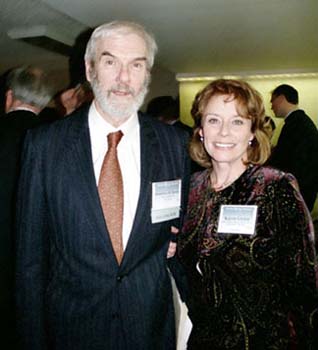
Karen Green
In recognition of Nancy Lyman Roelker’s role as a teacher, scholar, and committee member of the historical profession, and on the occasion of her 75th birthday, friends, colleagues, and former students established the Nancy Lyman Roelker Mentorship Award. The annual award recognizes and encourages a special quality exemplified by Professor Roelker through the human component in her teaching of history.
Mentoring should encompass not only a belief in the value of the study of history but also a commitment to and a love of teaching it to students regardless of age or career goals. Advising is an essential component, but it also combines a consistent personal commitment by the mentor to the student as a person. Offering a human alternative, frequently in quiet and unacknowledged ways, mentors like Roelker believe that the essence of history lies in its human scope. With this award, the American Historical Association attests to the special role of mentors to the future of the historical profession.
The award is given on a three-cycle rotation to graduate, undergraduate, and secondary school teacher mentors. Nominations for the 2004 prize were for precollegiate mentors. Karen Green of Aspen High School (Aspen, Colorado) and Robert May of Northwestern-Edison Community High School (Flint, Michigan) are the recipients of the 13th annual Roelker Mentorship Award.
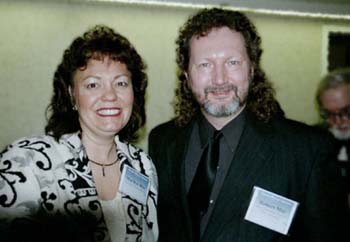
Robert May
In a career spanning 24 years, Karen Green has pursued the enriching relationships that the Roelker Mentorship Award seeks to recognize. Her colleagues and students praise her for motivating students to do their best, to try out new ideas, and to seize opportunities for further learning. They note her “endless enthusiasm” and uncompromising expectations of students. Through the one-on-one partnerships she builds with students, she reaches out to those who are flourishing as well as those who are underachieving or in trouble. As one student wrote, Green had a greater influence on her life than any adult apart from her parents. For the enduring ties she has established with her students and the inspirational example she has provided them, we are happy to recognize Karen Green as co-recipient of the 2004 Nancy Lyman Roelker Mentorship Award.
Robert May has served as a mentor to students and colleagues with an intensity that honors the Roelker Mentorship Award. Students, some of whom would never have considered college, see May as instrumental in developing their self-confidence. Teaching in an inner-city environment, he mentors not only his most advanced students, but also reaches out to students with special needs. He inspires students to learn history and to achieve high standards, and some of them have offered Robert May the high compliment of seeking to become teachers themselves. For his untiring efforts to help his students and colleagues achieve their potentials, we are happy to recognize Robert May as co-recipient of the 2004 Nancy Lyman Roelker Mentorship Award.
Honorary Foreign Member
At its second annual meeting in Saratoga in 1885, the newly appointed Committee on Nominations for Honorary Membership introduced a resolution, which was adopted, that appointed Leopold von Ranke as the first honorary foreign member. In the intervening 114 years, 89 other individuals have been so honored. Previously selected biennially, selection is now made annually honoring a foreign scholar who is distinguished in his or her field and who has “notably aided the work of American historians.” Currently, the AHA has 15 living honorary foreign members representing 10 countries.
President-elect Sheehan announced the addition to this roster of Franco Amatori of Italy. Franco Amatori, associate professor of economic history at Bocconi University, has long been the leading scholar analyzing the development of Italian business institutions and practices in the modern era. His own research and writing in this field has done much to shape our understanding of Italian business and business-government relations in the 19th and 20th centuries. His work is characterized by a balance between the need to establish a broad synthesis and the equally compelling need to understand business and government at the local and regional levels, within the firm and between firms, and within the Italian political setting.
Amatori has also gone out of his way to assist American scholars working in Italy and working on Italian and European subjects in business development. He has established a lecture series devoted entirely to bringing the best work in America into Italy for an Italian professional audience.
2004 Book Awards
The following prizes were announced for the year 2004.
Herbert Baxter Adams Prize
Ethan H. Shagan (Northwestern Univ.) for Popular Politics and the English Reformation (Cambridge Univ. Press, 2003). This book contains both a masterful critique of a half-century’s debate on the English Reformation and a solidly researched interpretation of the subject. He approves recent revisions of the once dominant Protestant view of the subject and criticizes the use of overly rigid concepts of “Catholic” and “Protestant.” Shagan’s own interpretation portrays the reformation in terms of religious experience, based on a pluralistic, non-reductionist concept of religion.
Prize in Atlantic History
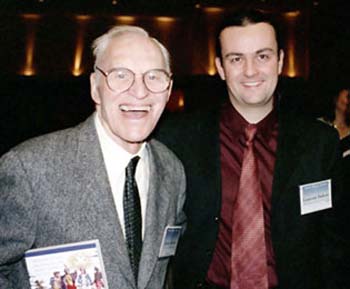
James A. Rawley and Laurent Dubois
Laurent Dubois (Michigan State Univ.) for A Colony of Citizens: Revolution & Slave Emancipation in the French Caribbean, 1787–1804 (Univ. of North Carolina Press for the Omohundro Institute of Early American History and Culture, 2004). Overturning previous commonplaces about the French Revolution in the Caribbean, Dubois argues that slaves appropriated the rhetoric and symbols of the French Revolution, emancipated themselves through force of arms, and transformed both the ideology and course of the revolution. In the process the author examines concepts of exclusion, inclusion, self-fashioning, gender, nation, and citizenship. By placing former slaves at the center of the picture, Dubois enriches our understanding not only of events in the eastern Caribbean, but of the larger Atlantic world.
George Louis Beer Prize
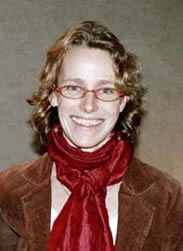
Kate Brown
Kate Brown (Univ. of Maryland Baltimore County) for A Biography of No Place: From Ethnic Borderland to Soviet Heartland (Harvard Univ. Press, 2004). Kate Brown’s A Biography of No Place represents borderlands history at its very best. Using both archival and oral history sources, she illuminates an extraordinary story of Soviet state modernization campaigns and Nazi genocide that reshaped the ethnic identity of what today we call “Ukraine.” Brown casts new light on the process of what too many observers have called “ethnic cleansing,” a form of violence that constitutes a primary feature of contemporary global conflicts.
Albert J. Beveridge Award
Edward L. Ayers (Univ. of Virginia) forIn the Presence of Mine Enemies: War in the Heart of America, 1859–1863 (W.W. Norton, 2003). Ayers retells the day-to-day experiences of soldiers and their families in two communities in the Shenandoah Valley, one in Virginia and Confederate, the other in Pennsylvania and Union. Surprisingly, Ayers found many similarities in peoples’ experiences as their communities gradually came to grips with the demands of the war. Ayers’ imaginative use of participants’ writings vividly illuminates how morally generous people could become dedicated to killing each other. This is a great book, beautifully written, and humane to its core.
Paul Birdsall Prize
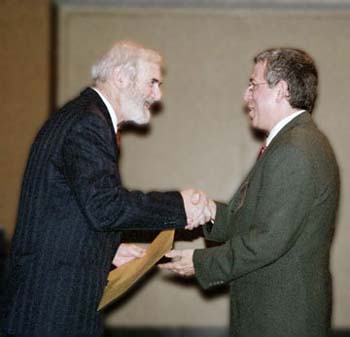
Robert M. Citino with Jonathan Spence
Robert M. Citino (Eastern Michigan Univ.) for Blitzkrieg to Desert Storm: The Evolution of Operational Warfare (Univ. Press of Kansas, 2004). Citino’s work is an outstanding scholarly presentation of the issues, challenges, and responses of societies and their military establishments to warfare since 1940. Displaying masterful knowledge of the human, organizational, and technological elements involved in the disposition of military forces in the world’s increasingly destructive wars, Citino’s thoughtful, splendidly written study enlightens specialists and generalists alike. He and his publishers also deserve praise for the detailed notes and bibliography that underpin this fine scholarly study.
James Henry Breasted Prize
Kurt Raaflaub (Brown Univ.) for The Discovery of Freedom in Ancient Greece (Univ. of Chicago Press, 2004). Through meticulous source analysis and careful contextualization, Raaflaub demonstrates that external threat and internal change led fifth-century Greeks to conceptualize freedom, traces how the concept evolved, and describes how it was used to limit the freedom of others. A significant expansion and thorough updating of an earlier German-language study, ably translated by Renate Franciscono, The Discovery of Freedom is a sophisticated and technically accomplished study of wide-ranging significance.
John Edwin Fagg Prize
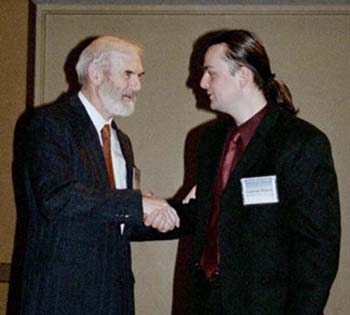
Laurent Dubois with Jonathan Spence
Laurent Dubois (Michigan State Univ.) for A Colony of Citizens: Revolution & Slave Emancipation in the French Caribbean, 1787–1804 (Univ. of North Carolina Press for the Omohundro Institute of Early American History and Culture, 2004). Laurent Dubois vividly recreates the explosive world of the French Caribbean in the wake of the French Revolution. Focusing on the island of Guadeloupe, he demonstrates how slaves and former slaves internalized, defended, and transformed the ideals of citizenship espoused by the French Revolution. Nevertheless, economic imperatives and racial anxieties led to the revocation of their short-lived emancipation.A Colony of Citizens is a vibrant description of the interaction of race, colonialism, and the language of rights.
John K. Fairbank Prize
Jordan Sand (Georgetown Univ.) for House and Home in Modern Japan: Architecture, Domestic Space, and Bourgeois Culture, 1880–1930 (Harvard Univ. Asia Center, 2003). Jordan Sand’s meticulously researched and copiously illustrated study challenges conventional notions of the capitalist, industrial, and Protestant foundations of domesticity. Examining transformations of the modern Japanese home between the latter 19th and early 20th centuries, he reveals the power of new ideas about family, design, taste, and the uses of space (hallways, dining room tables, gas stoves, locks). Sand shows how architects, officials, and consumers shaped bourgeois sensibilities, producing a cosmopolitan modernity that was distinctly Japanese.
Herbert Feis Award
Jonathan Martin (Brooklyn, New York) for Divided Mastery, Slave Hiring in the American South (Harvard Univ. Press, 2004). Jonathan Martin’s Divided Mastery is the first major work on this important topic. Moreover, its thesis and style place it among the best literature on American slavery. Martin sees the hiring system as an institutional Hobson’s choice: essential to slavery’s economics, but highly detrimental to its authority structure. Based on extensive research in narrative sources, Divided Mastery gives voice to enslaved persons, slave owners, and slave hirers and draws the reader fully into the dilemmas and opportunities that confronted them.
Morris D. Forkosch Prize
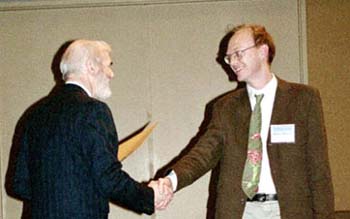
Robert Bickers with Jonathan Spence
Robert Bickers (Univ. of Bristol) for Empire Made Me: An Englishman Adrift in Shanghai (Columbia Univ. Press, 2004). Robert Bickers’ biography of a nobody recovers the fascinating but sad history of an obscure character on the margins of the 20th-century British Empire. Bickers illuminates this liminal life with humility and sensitivity, even as he acknowledges the limits to any such historical reconstruction. Combining innovative research and gripping prose, Empire Made Me traces the fluid boundaries between colonizer and colonized, home and empire, imperial and post-imperial, while simultaneously calling into question these very categories in its story of migration, alienation, and collaboration.
Leo Gershoy Award
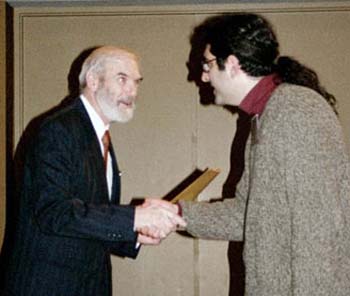
Ronald Schecter with Jonathan Spence
Ronald Schechter (Coll. of William and Mary) forObstinate Hebrews: Representations of Jews in France, 1715–1815 (Univ. of California Press, 2003). Schechter provocatively asks why Jews, who composed less than 1 percent of the population and wielded little economic or political power, should evoke such discussion in 18th-century France. This study of the representation and, importantly, the self-representation of Jews in France deftly reveals how non-Jewish and Jewish writers played off one another in defining community, national, and self identity. In so doing Schechter offers fresh perspectives on the Enlightenment, the nature of citizenship, and the history of intolerance.
Joan Kelly Memorial Prize
Laura Gowing (King’s Coll., London) for Common Bodies: Women, Touch and Power in Seventeenth-Century England (Yale Univ. Press, 2003). Based on prodigious research and a thoroughly original analysis of court records, popular literature, diaries, and letters, Common Bodies reinterprets the history of female sexuality in early modern England, showing how gender, sexuality, and community intersected in women’s experience of their bodies. Gowing effectively demonstrates that despite their sexual vulnerability and a rhetoric of female inferiority, women used sexual agency to challenge the boundaries of public and private and exercise power over the bodies and sexual activity of other women.
Littleton-Griswold Prize
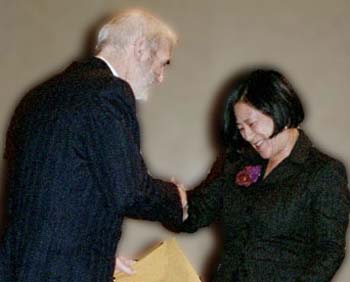
Mae M. Ngai with Jonathan Spence
Mae M. Ngai (Univ. of Chicago) for Impossible Subjects: Illegal Aliens and the Making of Modern America (Princeton Univ. Press, 2003). Mae Ngai’s Impossible Subjects offers a profound challenge to conventional narratives of immigration restriction, citizenship, and sovereignty in modern America. The narrative probes the legal production of the illegal alien and the citizen alien through chapters focused on the immigration acts of 1924 and 1965, Mexican and Filipino work and repatriation programs, Japanese internment, and the Cold War era Chinese confession program. Bold, creative, meticulously researched, and deeply humane, Impossible Subjects unflinchingly exposes the racial borders in the making of modern America.
J. Russell Major Prize
Steven Englund (Paris, France) for Napoleon: A Political Life (Scribner, 2004). This original and ambitious biography of Napoleon Bonaparte offers a complex portrait of a man whose legacy is usually obscured by political and military mythmaking. Englund’s Napoleon eludes facile labeling as liberator or tyrant, but instead appears as a decidedly human actor on a vast and bloody historical stage. Erudite, engaging, and beautifully written, Napoleon: A Political Life is destined to emerge as the definitive biography of one of history’s most colorful and ambiguous characters.
Helen and Howard R. Marraro Prize
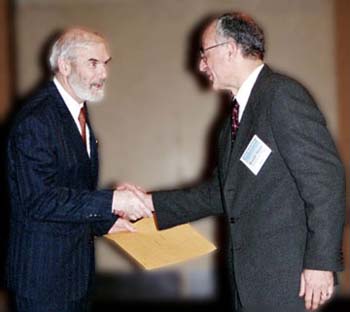
Ronald G. Musto with Jonathan Spence
Ronald G. Musto (American Council of Learned Societies and Italica Press) for Apocalypse in Rome: Cola di Rienzo and the Politics of the New Age (Univ. of California Press, 2003). Cola di Rienzo’s meteoric rise and fall as visionary restorer of the Roman Republic has frequently invited dismissal as the misguided ambitions of a quixotic dreamer or delusional demagogue. Ronald Musto’s remarkable new biography instead situates Cola’s life and career within the religious, cultural, and political currents of 14th-century Italy, revealing how his aspirations to create a reformed civil society also met apocalyptic expectations for a new age of justice, peace, and enlightenment.
George L. Mosse Prize
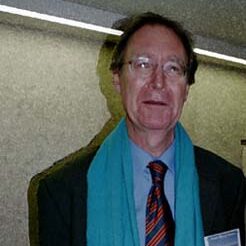
Siep Stuurman
Siep Stuurman (Erasmus Univ. Rotterdam) for François Poulain de la Barre and the Invention of Modern Equality (Harvard Univ. Press, 2004). Stuurman examines the work of a nearly forgotten writer of the early Enlightenment, François Poulain de la Barre (1647–1723). In feminist treatises published in the 1670s, Poulain drew on Descartes and rational Christianity to argue forcefully for the equality of women. Artfully placing Poulain in his cultural and religious contexts, Stuurman’s intellectual biography provides new perspectives on the Enlightenment and on the paths from Cartesianism to the radical claims for equality and women’s rights after 1789.
Premio del Rey Prize
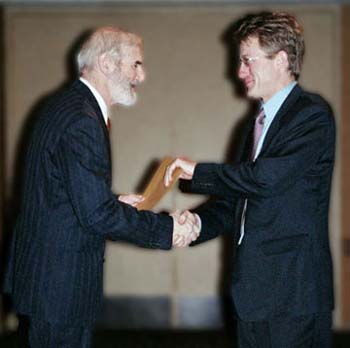
Jeffrey A. Bowman with Jonathan Spence
Jeffrey A. Bowman (Kenyon Coll.) for Shifting Landmarks: Property, Proof, and Dispute in Catalonia around the Year 1000 (Cornell Univ. Press, 2004). This beautifully written book studies the legal culture of Catalonia in the 10th and 11th centuries. In the course of guiding us through how courts worked and what groups vied for control of the land, Mr. Bowman offers a convincing alternative to works that over-simplify the “feudal revolution.” Far from a world of decaying justice and chronic violence, the legal processes that Bowman analyzes attest to the existence of effective and flexible public justice.
James Harvey Robinson Prize
History Matters: The U.S. Survey Course on the Web (https://historymatters.gmu.edu), produced by the American Social History Project (Graduate Center, City Univ. of New York) and Center for History and New Media (George Mason Univ.). Producers and creators Pennee Bender, Joshua Brown, and Roy Rosenzweig; Associate Directors Ellen Noonan and Kelly Schrum; and Co-executive Producer Stephen Brier. History Matters is an incredibly rich and “user friendly” web site. It offers students and teachers an amazing array of online resources, ranging from expansive lists of annotated web sites, to annotated syllabi that take viewers behind the scenes to see how various classroom activities actually worked (or didn’t), to intensive guides of how to use various types of primary sources. As such,History Matters is a model of its kind presented in a highly attractive and easy-to-navigate format.
Wesley-Logan Prize
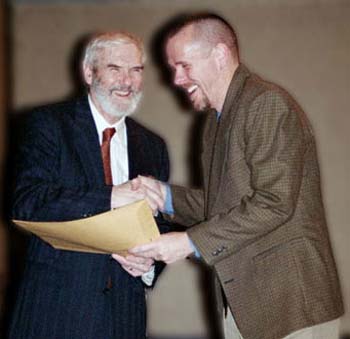
James H. Sweet with Jonathan Spence
James H. Sweet (Univ. of Wisconsin-Madison) forRecreating Africa: Culture, Kinship, and Religion in the African-Portuguese World, 1441–1770 (Univ. of North Carolina Press, 2003). In this expansive and stimulating study of Africans and African communities in Brazil and the entire Portuguese Atlantic world, James Sweet has performed that most difficult task of historians: he has given life to those whose experiences were thought lost. Transported into slavery from Central Africa, these women and men sustained dynamic indigenous systems of kinship and religious belief and practice. Through their stories, Sweet challenges deeply held assumptions about the nature of the African impact in the Americas.
Albert Corey Prize
The Albert Corey Prize, administered jointly by the AHA and the Canadian Historical Association, was announced at the Canadian Historical Association’s 83rd annual meeting at the University of Manitoba in Winnipeg, June 2004.
Stephen High (Nipissing Univ.) for Industrial Sunset: The Making of North America’s Rust Belt, 1969–1984 (Univ. of Toronto Press, 2003). Steven High’s imaginative comparison of the distinctive impact of deindustrialization in the Midwestern region of the United States and southern Ontario during the early post-industrial era is a compelling and readable book. His rich oral testimony supplements an extensive secondary literature and a broad public debate on both sides of the border to grapple in a comparative fashion with worker and community reactions to plant closures during the 1970s and early 1980s. Industrial Sunset takes a theme central to Canadian/American relations (the mobility of capital and labor across international boundaries) and breathes new life into it. By situating worker reactions on both sides of the border to downsizing in the context of public discourse on the role of governments and capital in moderating the impact of industrial restructuring, it extends a public debate that has become even more intense in the post Free Trade Agreement era.



